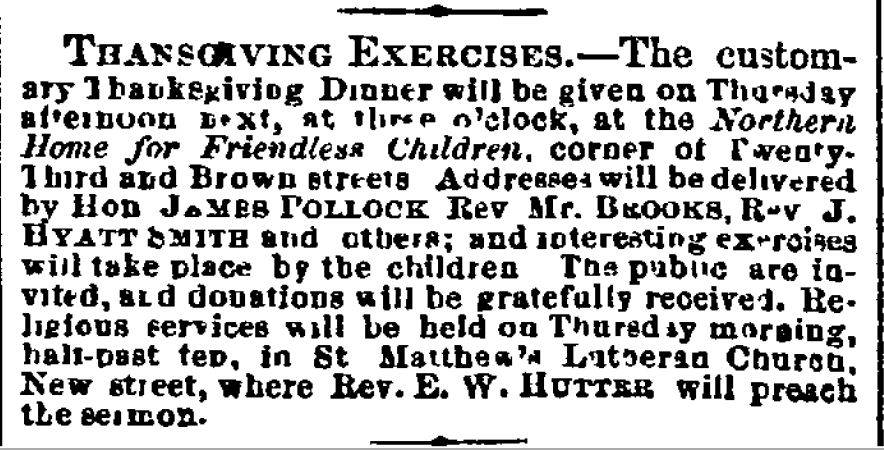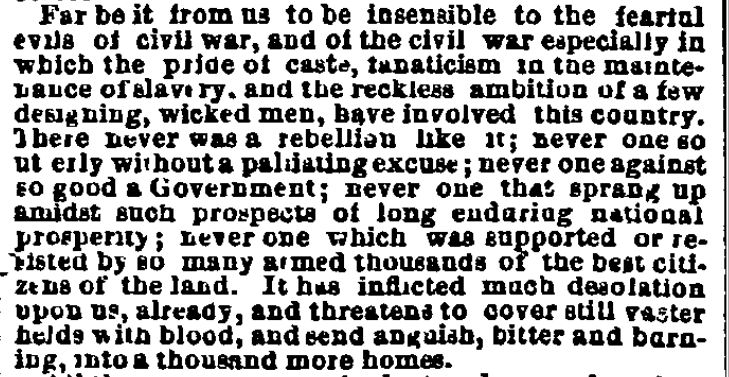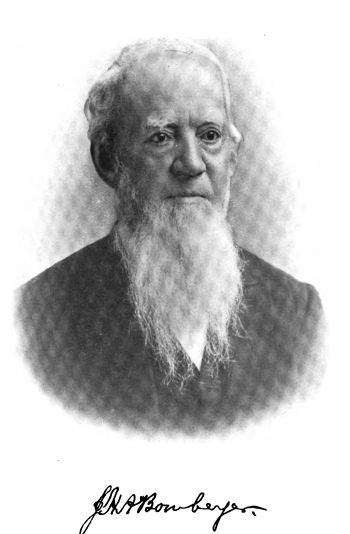Thanksgiving 1861 – Observance
Posted By Norman Gasbarro on November 24, 2011
Today is Thanksgiving 2011. One hundred fifty years ago, during the Civil War, Thanksgiving was celebrated at the call of the governors of the various states, with Pennsylvania’s recognition of the day being on 28 November 1861, which was at the call of Gov. Andrew Curtin. It was the first opportunity he had to call for a day of Thanksgiving in the Commonwealth as he was in his first year as governor.
Recognition of the day was widespread throughout Pennsylvania and newspapers reported on various activities that were taking place.
THANKSGIVING EXERCISES.–The customary Thanksgiving Dinner will be given on Thursday afternoon next, at three o’clock, at the Northern Home for Friendless Children, corner of Twenty-Third and Brown streets. Addresses will be delivered by Hon. James Pollock, Rev. Mr. Brooks, Rev. J. B. Byattsmith and others; and interesting exercises will take place by the children. The public are invited, and donations will be gratefully received. Religious services will be held on Thursday morning, half-past ten, in St. Matthew’s Lutheran Church, New street, where Rev. E. W. Hutter will preach the sermon.
THANKSGIVING DAY. — We learn that the philanthropic ladies of Roxborough intend, in Thursday, to give a pious treat to the soldiers of the National Guard Regiment at Camp Roxborough. Innumerable pies and other dainties have already been contributed. we have heard that the soldiers say that they would not complain if such a treat occurred every week.
The news from Maryland noted the following:
Everything in the shape of locomotives, machinery, &c., belonging to the Baltimore and Ohio railroad, have been removed by the Rebels and taken to the vicinity of Winchester. Even the double track for twenty miles has been torn up…
Last week, Major Stone, Chief of the Provost Guard, with a company of cavalry… made the arrest of Rev. Samuel V. Leach, a clergyman of the Methodist persuasion, whom he sent to Fort McHenry. Other cases, where parties were charged with disaffection, were investigated and dismissed….
The Massachusetts regiments are making preliminary arrangements to celebrate Thanksgiving in camp. Turkeys, chickens and pumpkins are being procured.
Also, another dispatch from Baltimore noted that help was on the way for the regiments encamped in that vicinity.
Some of the regiments which for several weeks have been encamped around Baltimore are, I am told, to unite with the next great Naval expedition, and their places here will be supplied by fresh troops expected from the North. There are now at Annapolis thirteen to fourteen thousand soldiers awaiting orders.
Many of the residents of Pennsylvania heeded the call of their religious leaders to go to worship. The Philadelphia Inquirer, over the course of the next several days, reprinted the full text of each of the sermons delivered on Thanksgiving Day. Most , if not all of what was said in the churches in the Lykens Valley area is not available for examination, so reliance on what was said in Philadelphia by the leaders of the major denominations is one way to determine what was being said about the relationship of the war to religious beliefs – and what the people of the Lykens Valley understood it to be.
Excerpts of the sermon of Rev. John Henry Augustus Bomberger, D.D., of the German Reformed Church are presented. Rev. Bomberger, who was one of the leading theologians of the church, based his sermon Psalm 34, “I will bless the Lord at all times….” He was one of the few to relate the war to the evils of slavery:
Far be it from us to be insensible to the fearful evils of civil war, and of the civil war especially in which the pride of caste, fanaticism in the maintenance of slavery, and the reckless ambition of a few designing, wicked men, have involved this country. There never was a rebellion like it; never one without a paldating excuse; never one against so good a Government; never one that sprang up admist such prospects of long enduring national prosperity; never one which was so supported or resisted by so many armed thousands of the best citizens of the land. It has inflicted much desolation on us already, and threatens to cover still vaster fields with blood, and send anguish, bitter and burning, into a thousand more homes.
On this Thanksgiving Day 1861, there was no sense that the war would last for more than three more years and the anguish and desolation spoken of by the Rev. Bomberger would be found in a thousand-thousand more homes, with the effects lasting for generations. There was also no overriding sense that the war was being fought to end the scourge of slavery. That would come later. The people of the nation did heed the call to worship and pray and in the context of what they believed, there was not much more they could do. The great struggle had to play out on the battlefields. In the coming year, 1862, that reality would become apparent.
Articles are from the Philadelphia Inquirer of November 1861 are available through the on-line resources of the Free Library of Philadelphia. The portrait of Rev. John Henry Augustus Bomberger is from a history of St. John Reformed Church of Reigelsville, re-published in a free, downloadable version (click here).
 ;
;







Comments